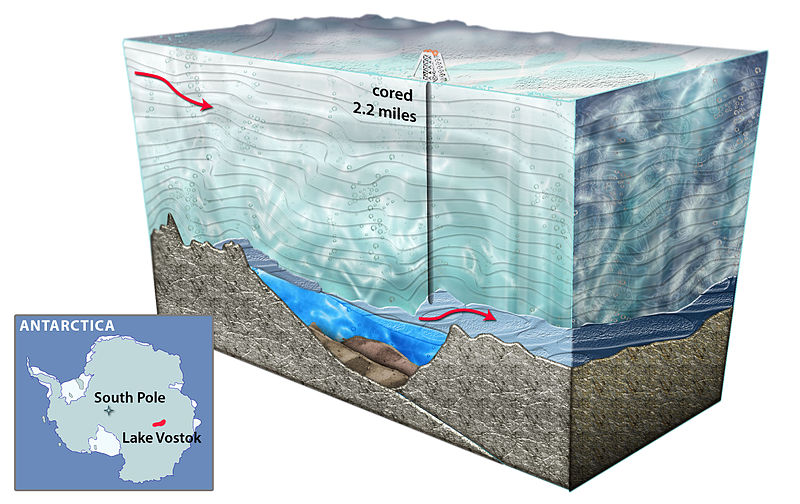Lake Vostok has been buried under two miles of ice for 15 million years, but scientists can now say life has found a way to persist and thrive there. Pristine samples from the lake were examined and found to contain genetic signatures for thousands of species. Some sequences suggest more complex animals like worms or even fish may be lurking in the pitch black, sub-glacial water. Scientists say this has ramifications far beyond Antarctica:
The Telegraph — his will raise hopes that life may be found in other extreme environments on other planets. One of Jupiter’s moons, Europa, for example, is covered with an icy shell that may hide a liqud ocean below where life could exist.
Dr Scott Rogers, a biologist at Bowling Green State University, in Ohio, and led the DNA analysis of biological material found in the ice cores, said: “We found much more complexity than anyone thought. “It really shows the tenacity of life, and how organisms can survive in places where a couple dozen years ago we thought nothing could survive. “The bounds on what is habitable and what is not are changing.”Lake Vostok is around 160 miles long and 30 miles wide, covering an area of more than 6,000 square miles beneath the Antarctic ice sheet. Among the bacteria found in the samples brought to the surface were those commonly found in the digestive systems of fish, crustaceans and annelid worms, raising the prospect there could be more complex life still living in the lake.
Isolated from the rest of the world for 15 million years, some of the DNA sequences were found to be unique to science and may belong to new species that have evolved in the depths.
The lake is connected to a heretofore unknown and unsuspected network of sub-glacial rivers and streams, which could bring in once living material from other locales. But the presence of unique sequences supports the idea that life may be thriving and evolving in the alien environment right here on earth.


Unknown lifeforms lurking in the Stygian darkness of a hidden lake buried deep beneath the Antarctic ice since before Man first walked the Earth? it can only mean one thing – Shoggoths!
Not neccessarily – it might be The Thing (Though now that I think on it, the differences are pretty minimal).
The important question is how many research scientists were devoured while getting us this information. I suspect the answer is ‘none’, which is good for research everywhere but makes the lovecraftian in me go ‘aw.’
Guys, haven’t you read At The Mountains? It’s clearly the sign of Elder Things.
I just hope the explorers resist the lure of flying up over the mountains. That way madness lies.
This nature article (http://www.nature.com/news/claims-of-lake-vostok-fish-get-frosty-response-1.13364) reports some say it’s probably shoddy technique and contamination. Would be interesting if there was something there though.